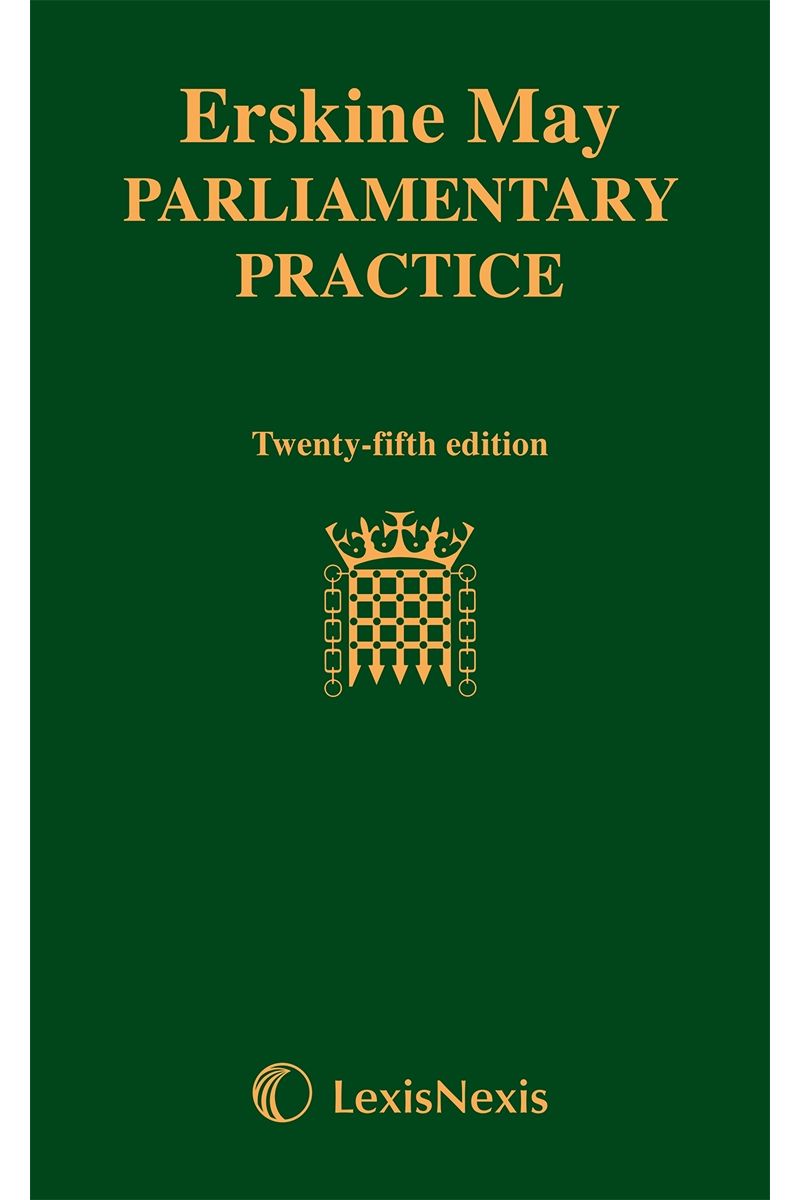Erskine May: Parliamentary Practice 25th edition
Published: 29 May, 2019
Why should you buy Erskine May: Parliamentary Practice 25th edition
Erskine May is the eponymous guide to parliamentary practice and procedure, providing accurate and detailed information on the constituent parts of Parliament, its powers and jurisdictions, membership of either House, financial procedure and the process of debate.
Alongside the incremental changes to and refinements of parliamentary practice which happen all the time, the 25th edition covers many significant developments since the last edition in 2011, including:
- A new chapter on "English Votes for English Laws" introduced following the 2015 General Election, which details the varied and complex ways in which these engage with both primary and secondary legislation.
- The process of implementing the outcome of the 2016 referendum on the UK's membership of the EU. An account is given of the procedures in both Houses for the scrutiny and approval of the transposition of EU law into UK law.
- Further parliamentary consequences of the coalition government that took office in 2010, including the reforms introduced by the Wright Committee, the evolving impact of the introduction of the new category of "backbench business" and the election of Deputy Speakers in the House.
- An e-petitions system overseen by a new Petitions Committee set up in 2015.
- Changes to select committee working practices and powers under their new elected chairs.
- A new financial timetable introduced in 2017 with the Chancellor's annual budget statement moving from Spring to Autumn, and a change to how Estimates Day debates are handled.
- Important reforms to how the conduct of both MPs and members of the Lords is governed and how breaches of the respective codes are pursued.
- Continuing arguments over the future of parliamentary privilege. Recent relevant court cases and developments within Parliament are assessed, including the 2013 Joint Committee on Parliamentary Privilege.
Part 1 - Constitution and Organisation of Parliament
1. The constituent parts of Parliament
2. Elections
3. Disqualification for membership of either House
4. Members and Elected Officers of Parliament
5. Rules governing the conduct of Members of both Houses and the disclosure of financial interests
6. Administration of Parliament and the Parliamentary Estate
7. Parliamentary papers, publications and records
8. A new Parliament and opening and closing of session
9. Formal communications between Crown and Parliament and between Lords and Commons
10. Parliament and international assemblies
Part 2 - Powers and Privileges of Parliament
11. Power and jurisdiction of Parliament
12. The privilege of Parliament
13. Privilege of freedom of speech
14. Privilege of freedom from arrest
15. Contempts, and handling complaints of contempt or breach of privilege
16. The courts and parliamentary privilege
Part 3 - Conduct of Business
17. A sitting: general arrangements in the House of Commons
18. The control and distribution of time for business in the House of Commons
19. Order and handling of business in the House of Commons
20. The process of debate in the House of Commons by motion, question and decision
21. Maintenance of order during debates in the House of Commons
22. Questions to Ministers
23. Sittings in Westminster Hall
24. Petitions
25. Organisation and conduct of business in the House of Lords
Part 4 - Public Legislation
26. Preliminary view of public bills
27. Legislative procedure in the Commons and devolved legislative competence
28. Proceedings on public bills in the House of Commons
29. Proceedings on public bills in the House of Lords
30. Proceedings on public bills: matters affecting both Houses
31. Delegated legislation
32. Parliamentary oversight of matters relating to the European Union
Part 5 - Financial Procedure
33. Overview of financial procedure
34. Public expenditure and Supply
35. Expenditure: Money resolutions
36. Ways and Means and Finance Bills
37. The role of the House of Lords in financial procedure
Part 6 - Committees
38. Select committees in the House of Commons
39. General Committees in the House of Commons
40. Select Committees in the House of Lords
41. Joint committees of the Lords and Commons
Part 7 - Private Legislation
42. Preliminary view of private bills
43. Preliminary proceedings in both Houses on private bills
44. Petitions relating to private bills in the House of Commons
45. Proceedings in the House of Commons on private bills
46. Proceedings on private and personal bills in the House of Lords


